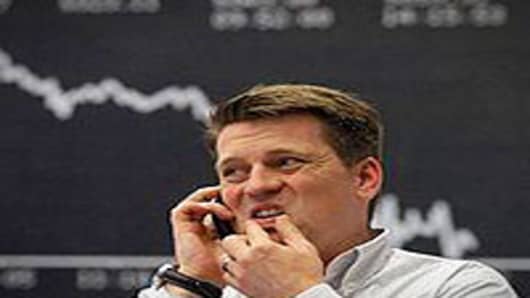European stock index futures pointed to a lower open on Wednesday, mirroring losses in U.S. and Asian shares as rising tensions in the Middle East and North Africa lift oil prices and stoke inflation fears.
European stocks ended lower on Tuesday after fresh jitters over political turmoil in the Middle East and North Africa prompted some investors to cash in recent strong gains on banking and energy stocks.
Concerns over oil supply flared up once again after Saudi Arabia's stock market plunged, posting its largest decline in over two years on a mixture of reports about the arrest of a cleric and tanks heading towards Bahrain.
Authorities retained a Shi'ite cleric who called for a constitutional monarchy and an end to corruption and discrimination, Reuters reported quoting human rights activists.
A report in an Egyptian newspaper quoted eyewitnesses as saying that tanks were heading from Saudi Arabia to Bahrain.
"There are no Saudi Arabian tanks in Bahrain. Tanks identified on Monday evening were Bahraini tanks returning from Kuwait National Day celebrations, where military from several Allied countries participated in an event commemorating Kuwait’s liberation in 1991," a Bahrain government spokesman said in an email.
The jittery oil market is likely to continue to make headlines on Wednesday.
On the macroecomic front, investors will focus the euro zone producer price index for changes in the selling price of goods and services.
Figures released on Tuesday showed euro zone inflation in February rose to its highest level since October 2008, well above the European Central Bank's target and likely to intensify the ECB's inflation-busting rhetoric.
Markets are now positioned for the ECB to be hawkish on inflation, and confirm the latest phase in the withdrawal of banking sector support at its Thursday meeting.
Portugal's Prime Minister Jose Socrates will meet German Chancellor Angela Merkel on Wednesday to discuss Europe's rescue fund, the European Financial Stability Facility (EFSF), and next month's euro zone summits.
The leaders will also discuss the future mechanism that will replace the EFSF. Many investors are convinced Portugal will be forced to seek a bailout from the EFSF and the International Monetary Fund.
Portugal's Treasury and Government Debt Agency plans to buy back two government bond lines maturing in the second quarter of 2011. The agency is offering to buy back the 3.20 percent April 2011 and 5.15 oercent June 2011 bonds.
The buyback comes as Portuguese 10-year yields hover above 7 percent - a level regarded by many as unsustainable.


